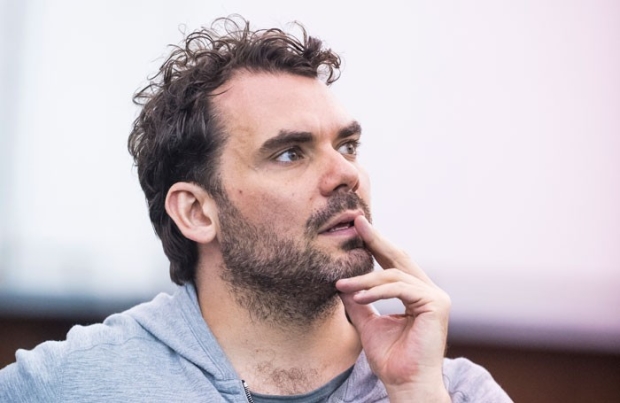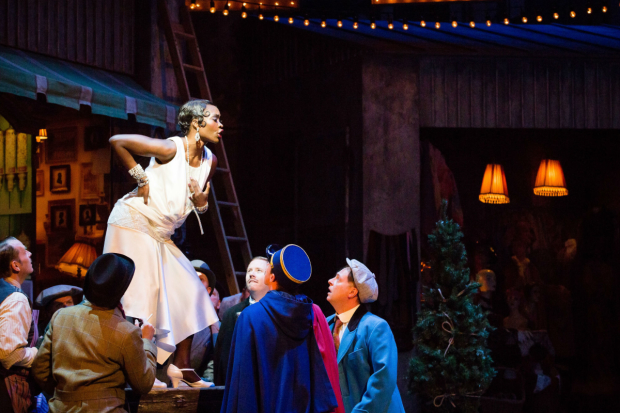Daniel Kramer: 'Rekindling hope is a massive part of my job'

© Tristram Kenton
No longer the new kid on the block, English National Opera's American artistic director Daniel Kramer has had a year in the job. In that time the 39 year-old has been working on the upcoming season, while also directing Tristan and Isolde at the Coliseum and Romeo and Juliet at Shakespeare's Globe. With his programming at the Coliseum, he has focused on a new philosophy of mixing standard favourites with risky rep and popular choices, which can be easily seen in the forthcoming season – due to go onsale exclusively with WhatsOnStage on Friday. The prospect of the brand new commission of Nico Muhly's Marnie in November is particularly exciting, as is The Turn of the Screw, due to take place at Regent's Park Open Air Theatre in 2018. We caught up with Kramer to find out how London has been treating him.
Book tickets exclusively for the new ENO season here
How's it going?
There's been an overwhelming amount of support from the ENO board to get onto a more competitive European timeline and have the option of booking the best singers and directors. That's also helping us address the criticism that the house may not have been focusing enough on the cultivation of British talent.
Most opera houses book two or three years in advance, and changing to that model was a huge step for the company. I'm now programming for 2019-20, by then we'll be doing ten main-stage shows with the reduced sums at our disposal.
There were obviously very painful savings and cuts that had to be made to the organisation when it lost its Arts Council funding, so when I arrived I had a very clear sum of money and had to decide how we would use it. It was a whirlwind. Now begins the second phase of my job, which is producing the actual work.
Is the job what you expected it would be?
It is so much bigger. I always thought I had a great work ethic, but now, just being in a rehearsal room is like a holiday. When you're artistic director you can have three 20-minute meetings an hour and get home if you're lucky at 10 or 11 at night. It's a whole other mental and cardiovascular life. And nothing could have prepared me for how it works within the building. I inherited a chorus that had been traumatised by cuts to full-time contracts, an orchestra whose beloved MD had been taken away… The whole company had been really shaken up by the £5,000,000 cut. Rekindling hope is a massive part of the job.
ENO was at its best in the days when it nurtured repertory talent. Do you need to get back to that?
I so wish we had seven or eight singers on contract, but with the reduced seasons I wouldn't be able to offer them enough work. However, with our new incredible head of casting, Michelle Williams, we're now programming to 2020, and I believe audiences will start to see more of a thread or a track. Some of our most beloved British singers and some exciting emerging ones will be appearing two or three times a year over the next few years, I hope. I want to see singers like Andrew Shore on that stage at least once or twice a year.
Your new season launch (2017-18) was well received. Did that hearten you?
I think the whole company took solace from the sense that a new bridge was being built and we're being allowed to cross over it. We're delighted audiences seem to like this one, because the seasons only get stronger from now on. We can only hope the critics and audiences – and the company – will love what we have in store. So yes, please let this be a new step forward.
You said you wanted to broaden the company's output into operetta and musicals. Could you flesh that out a bit?
We've thrived on classics like Anthony Minghella's Madam Butterfly – they're our bread and butter – and The Pirates of Penzance did nearly as well. Since we sing in English it seems a natural fit for us to be the home of Gilbert and Sullivan. What we've seen with Pirates and Sunset Boulevard is we're getting a great crossover from those more commercial shows into our main stage seasons. And one of the key missions we have now is to cultivate a new audience for opera.
In terms of musicals we have a contract with Grade Linnit to produce a five-week musical run every spring, and we would love them to continue that. It keeps our forces employed in our own house. I don't know what's going to happen when that contract is up, but we'd like to keep one musical a year if possible. These are the shows that buy us the chance to do Lulu and The Winter's Tale. And the fact that Lulu was the surprise hit of last season was an absolute joy to me.
Hiring Cal McCrystal to direct Iolanthe seems to suggest that you're going to be radical with your operettas.
I hope so. When another show fell through, that became my first official programming decision. Cal and the great designer Paul Brown have created lush, beautiful romantic sets where insanity and comedy rule.
I saw one of Sasha Regan's all-male G&S shows when it came to the Richmond Theatre. I loved the evening and was smacked sideways by Lizzi Gee's choreography, so I've paired Lizzi with Cal.
Another resource you've got is a store of proven hits that you can revive. You've not been afraid to ditch things that haven't worked and bring back favourites like Rigoletto and A Midsummer Night's Dream.
Four or five shows a season have to be from our revival stable. I just have to choose the right ones. We're pulling from the whole repertoire of what we have in stock. Of course, sometimes after ten years they trash things; but I inherited a list of sets that we have and also a 'please-trash-this-one-immediately' wish-list. There were two operas I wanted to revive, only to be told 'oops, John Berry [Kramer's predecessor as AD] trashed those'.
It's a real balancing act. When's the right moment to bring back Richard Jones's Mastersingers of Nuremberg? And we also need to think of the future, so that when we put a new production into storage it has a chance of being revived. That means that when we next do La bohème we'll need to decide carefully who is the best director for it. We must always be careful in our pairing of director and opera. Even my own Traviata next season: I need to make sure it speaks to our audience. But we're also here to interpret classic stories for a new age.











